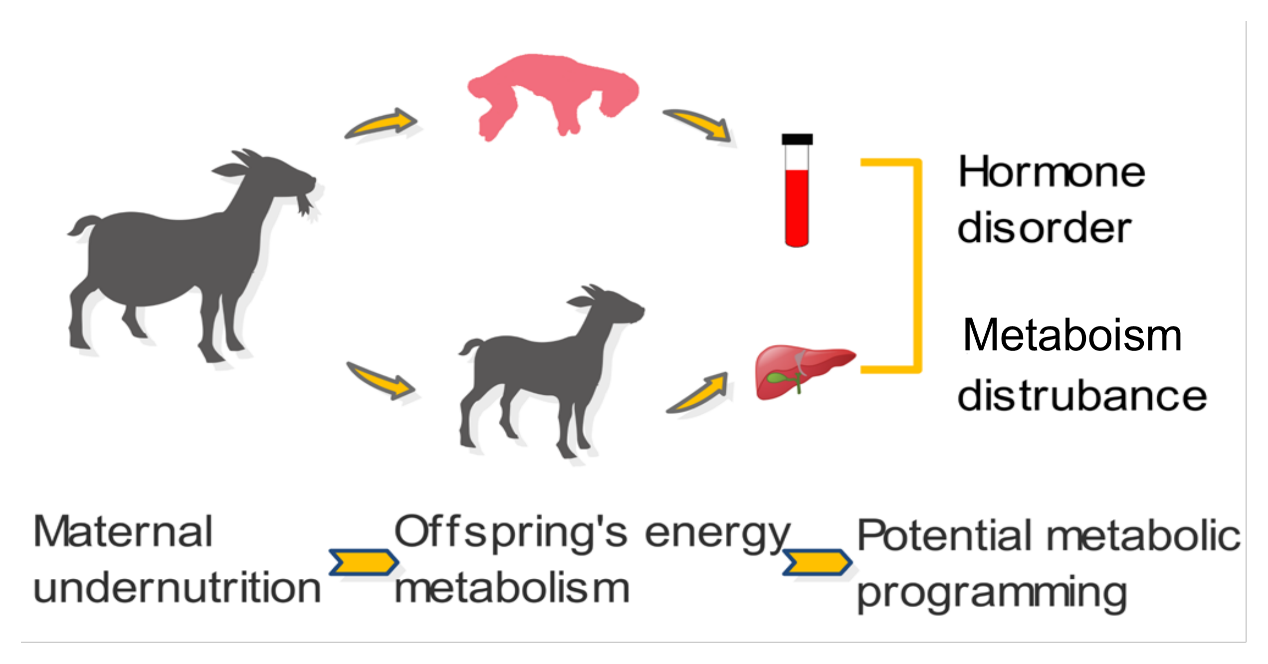Maternal undernutrition is a concerning problem for human health and animal husbandry production. Stress caused by nutrient deficiency in utero often induces metabolic disturbances,retarded growth of muscle tissue and underdeveloped immune system for adjustment to the nutrient-poor environment. These changes in function during pregnancy may even persist throughout the offspring's lifetime.
The liver has multiple important physiological functions during embryonic development and after birth including hematopoiesis, metabolism and immunity.
Liver modulates systemic energy homeostasis in mammals and is the first sensor and processor to deliver maternal nutrients to a growing fetus via the umbilical vein.
During intrauterine development, the liver initially functions as the principal hematopoietic organ for the first eight weeks.The functional shift from hematopoiesis to differentiated hepatocytes begins during midgestation.
Developing liver cells are sensitive to the intrauterine microenvironment, including nutrient status, during mid-gestation. At birth, the neonatal liver remains relatively immature. The functional capacity of liver tissue undergoes several changes during the early postnatal period, and the liver is basically mature at the juvenile stage. Most of the previous research focused on the nutrient supply at the stage of lactation and late gestation in animal husbandry, but nutrient requirement during mid-gestation is generally ignored. Therefore, the effect of nutritional changes in middle gestation on offspring remains unclear.

TAN Zhiliang’s research group the Institute of Subtropical Agriculture (ISA) of Chinese Academy of Sciences use goats as model animals to study the changes of energy metabolism, meat quality and liver immune function in offspring suffering nutritional restriction in middle gestation.
The team found 40% maternal nutrition restriction changed energy metabolic process and innate immune function in the livers of the fetuses. “The offspring of different genders had different responses to maternal malnutrition” said ZHOU Xiaoling, a PhD student at ISA “the body weight, liver weight and blood metabolite levels in the female fetuses or kids did not alter, but the body weight and triglyceride and growth hormone levels in the male fetuses or kids were reduced by varying degrees.”
The results also showed that nutritional restriction increased maternal glucagon level. Gene expression and enzyme activity of energy metabolism in the liver of ewe were also changed, indicating that the maternal body was in a physiological metabolic state of reducing energy consumption and saving glucose.
Nutritional restriction in the second trimester has an overall impact on fetal liver metabolome. The expression of hormones, genes and enzymes related to energy state perception and gluconeogenesis were changed in offspring fetus.
Hormone secretion and liver glycogen levels were also altered in the lambs. These results indicate that maternal nutrition can affect the hormone response and liver physiological metabolism of offspring for a long time by comprehensively changing liver metabolism and expression of related genes.
In terms of the quality of lamb meat, restrictions in middle gestation hinders the growth and development of lambs, reduces daily weight gain, reduces lamb meat production, and affects meat color and brightness. However, muscle chemical composition, fatty acid content and composition, and amino acid content and composition are not affected.
In addition, the immune function of the liver cannot be ignored. Animal data suggest that nutritional restriction during gestation shows persistent immunological impairment for several months.
“In the study of toll-like receptor signaling pathway in fetal sheep liver, we found that nutritional restriction in middle gestation partially affected the innate immune function of the liver” said CHEN Wenxun, a PhD student at ISA.
Notably, mRNA expression of toll-receptor signaling pathway related genes was up-regulated, while protein level was not changed. It is likely that other mechanisms inhibit the translation of toll-receptor related proteins, and more precise experiments are needed to further verify this process.
These researches have enriched our knowledge of maternal effect on offspring’s growth and development. Published papers and links are shown below: The main findings of these researches have published on Nutrition & Metabolism (https://doi.org/10.1186/s12986-019-0346-7), Animals (https://doi.org/10.3390/ani9040173 ) and Journal of Animal Science and Biotechnology (https://doi.org/10.1186/s40104-019-0336-7 ).
Contact: YAN Qiongxian
E-mail: yanqx14@isa.ac.cn
Institute of Subtropical Agriculture, Chinese Academy of Sciences
